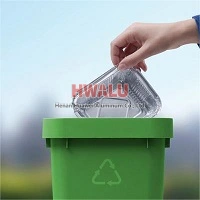Cigarette aluminum foil parameters Alloy: 3004 8001 Thickness: 0.018-0.2mm Length: can be customized according to customer needs Surface: One side has a high light emissivity, and the other side has a soft matt finish. what is the metallic paper in a cigarette box The metallic paper in cigarette packs is aluminum foil. One is to keep fragrance. Aluminum foil can prevent the smell of cigarette ...
aluminium foil specification Aluminum foil for coated foil Coated Products gauges/thicknesses 0.00035” - .010” Coating thicknesses .002″ Width .250” - 54.50” Length customize aluminum foil for coated foil We offer a variety of Coated Products Carbon coated aluminum foil Heat Seals Corrosion Resistant Epoxies Slip Lubes Print Primers Release Coatings, ...
What is hydrophilic aluminum foil The surface of hydrophilic aluminum foil has strong hydrophilicity. The hydrophilicity is determined by the angle formed by the water sticking to the surface of the aluminum foil. The smaller the angle a, the better the hydrophilic performance, and vice versa, the worse the hydrophilic performance. Generally speaking, the angle a is less than 35. It belongs to hydrophilic pro ...
What is Aluminum Foil for Electricians Electrical aluminum foil is a special type of aluminum foil that is coated with an insulating material and is commonly used in electrical insulation applications. Its insulating layer prevents the loss of current from the surface of the aluminum foil while protecting the foil from the external environment. This aluminum foil usually requires high purity, uniformity, a ...
What is aluminum foil for insulation? Aluminum foil for insulation is a type of aluminum foil that is used in various forms of insulation to help reduce heat loss or gain. It is a highly effective material for thermal insulation due to its low thermal emissivity and high reflectivity. Aluminum foil for insulation is commonly used in the construction industry for insulating walls, roofs, and floors of building ...
Aluminum foil is recyclable. Due to the high purity of aluminum foil materials, they can be reprocessed into various aluminum products after recycling, such as food packaging, construction materials, etc. Recycling aluminum, meanwhile, is an energy-saving process that involves melting down aluminum scrap to create new aluminum products. Compared to producing aluminum from raw materials, the recycling process of a ...
Fire or explosion in aluminum foil rolling must meet three conditions: combustible materials, such as rolling oil, cotton yarn, hose, etc.; combustible materials, that is, oxygen in the air; fire source and high temperature, such as friction, electric sparks, static electricity, open flames, etc. . Without one of these conditions, it will not burn and explode. The oil vapor and oxygen in the air generated duri ...
Cast-rolled aluminum foil production process Aluminum liquid, aluminum ingot -> Smelt -> Continuous roll casting -> Winding -> Cast roll finished product Plain foil production process Plain foil -> Cast-rolled coil -> Cold rolled -> Foil rolling -> Slitting -> Annealing -> Plain foil finished product The manufacture of aluminum foil is similar to making pasta at home. A large b ...
1050 aluminum foil is made of 99.5% pure aluminum. It has high corrosion resistance, excellent thermal and electrical conductivity, and good formability. It is a common type of 1000 series aluminum alloy. Aluminum foil 1050 is also known as 1xxx series pure aluminum alloy, which has a wide range of applications in various aspects. What are the common applications of 1050 aluminum foil? Aluminum foil 1050 is use ...
Aluminum foil has the following advantages in food packaging: Barrier property. Aluminum foil has excellent resistance to water, air (oxygen), light, and microorganisms, which are important factors in food spoilage. Therefore, aluminum foil has a good protective effect on food. Easy processing. Aluminum has a low melting point, good heat sealing, and easy molding. Can be processed into any shape according to ...
1. Insulation and fragrance preservation Aluminum foil lunch boxes are usually used as paper-wrapped beverage packaging. The thickness of the aluminum foil in the packaging bag is only 6.5 microns. This thin aluminum layer can be waterproof, preserve umami, anti-bacterial and anti-fouling. The characteristics of preservation of fragrance and freshness make the aluminum foil lunch box possess the properties of fo ...








